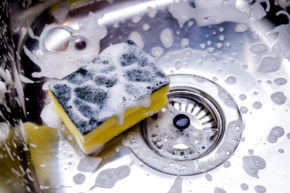
How to Clean Your Stainless Steel
8 November 2022
View PostPosted on 15 September 2016 3 min read
You may have a jug of filtered drinking water sitting in your fridge, but softening water and filtering it actually mean different things.
Filtering water typically refers to a drinking water tap or jug filter, whereas when we talk about water softening, we are referring to a unit that removes hardness minerals from the incoming water supply. Softening water improves it’s performance in many areas of the household, whereas filtration is mainly for drinking water. There are many reasons people filter their drinking water, the most common reason is that it simply tastes better. Filtering water removes impurities like chlorine and bacterial contaminants, giving it a cleaner, fresher taste whether it’s infused with tea, mixed with squash or simply drunk by itself. But these filtering devices will not remove hardness minerals. Softened water is excellent for making drinks as it absorbs aromatics more readily as well as preventing scale in your kettle.
If you want to benefit from soft water throughout your home, we offer a drinking tap with our installations at no additional charge.
While taste is an important reason, filtration has several health benefits too. When water is filtered, it’s passed through a device containing activated carbon – this is produced from natural materials such as coal and coconut shells. The carbon acts as a net, catching chlorine and organic contaminants (like bacteria) as well as some of the nastier contaminants like mercury and lead.
Filtration systems come in several types:
Container filters – deliver treated water through a dedicated drinking water tap from under the sink. This is because there’s no need to filter the entire house’s supply, of which only about one per cent is used for drinking – the rest is used for laundry, flushing toilets, bathing and so on which is where softening the water has the most benefit for the least cost.
Jug filters – convert tap water into filtered water but these are a less hygienic and more expensive option than their under sink counterparts.
Many people who don’t trust their tap water drink bottled instead – but aside from being many hundreds of times more expensive than filtered water, bottled water contributes to environmental damage through the huge amount of packaging that gets sent to landfill every day. According to Wastewatch, that’s not all: producing plastic bottles uses millions of barrels of oil every year, not to mention the toll of transporting it to shops around the country. A team of research scientists at Ccrest Laboratories in Canada found that 70% of bottled water brands had high levels of bacteria. In their experiment, tap water had lower bacteria levels.
We are fortunate in this country to have access to clean, treated drinking water almost for free, and the vast majority of people never experience any health problems from drinking unfiltered tap water. However, if you want to put an additional line of defence between you and water contaminants – or if you just like the taste – investing in a water filter along with your water softener is the best, cheapest and most eco-friendly solution.
Discover our range of drinking water taps, which can be connected to your water softener for fresh drinking water in your home. Choose from a variety of models, including Classic, Renaissance and Deco. All of our 3-way taps can be installed with your water softener – contact our team today to find out more.
Stylish Drinking Taps – Choose a three-way tap for ultimate kitchen convenience – See The Range